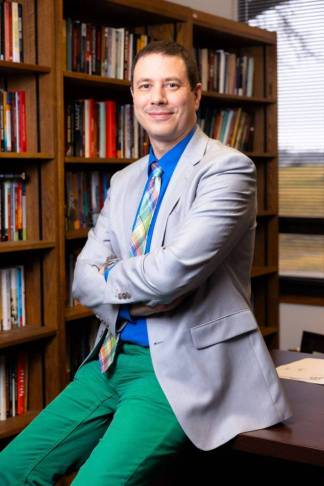Associate Professor and Department Chair
Phone: 903.565.5758
Email: csnider@uttyler.edu
Building: CAS Office 118
Department: History
Popular Searches

Associate Professor and Department Chair
Phone: 903.565.5758
Email: csnider@uttyler.edu
Building: CAS Office 118
Department: History
Colin M. Snider is an Associate Professor of Latin American History and serves as the Department Chair. He received his B.A. with majors in History, English Literature, and Spanish from Ohio Northern University, and he earned his M.A. and Ph.D. in Latin American History with a minor concentration in Indigenous history from the University of New Mexico. He teaches courses on Colonial Latin America and Modern Latin America, Latin American-US Relations, the History of Human Rights, the Cold War, Native American History, and Honors courses on film, graphic novels, and history. He has studied in Costa Rica and Brazil and has traveled throughout Latin America.
In his research, Dr. Snider focuses on a variety of social and political issues that revolve around military dictatorships and democratic regimes in Latin America, focusing especially on Brazil. His research has led to published articles and book chapters on student movements and mobilization throughout the 20th and 21st century, exploring questions of university autonomy in democratic and authoritarian regimes, educational demands and reforms, and the relation between student activism and religious reform in the 1960s. He has also begun publishing work on human rights, memory, and nation, with articles on representations of gender in Brazil’s National Truth Commission report and on the expansion of truth commissions and their implications for understanding national histories, collective memories, and human rights.
His current manuscript, tentatively titled Complicated Campuses: Higher Education, Development, the Middle Class, Students, and the State in Brazil, 1955-1988, uses higher education to consider questions of social mobilization, visions of development, and state-society relations in democratic and authoritarian regimes.
Beyond his teaching and research, Dr. Snider is active in a variety of professional organizations, including the American Historical Association, the Conference of Latin American History, the Brazilian Studies Association, the Southeastern Council on Latin American Studies, and the World History Association of Texas. He has been quoted in news stories on Brazil for the New York Times, Vox, Foreign Policy, and other outlets and podcasts. He also currently serves as the book review editor for the quarterly scholarly journal The Latin Americanist.
Beyond academic life, Dr. Snider enjoys spending time with his family and dogs, listening to almost all types of music, reading fiction, and even playing the occasional video game.
Selected Publication
“‘The Lessons of France’: Brazilian Media, the French May, and Discourses of Democracy in 1968.” In forthcoming volume on 1968 in Europe and the Americas, edited by Kate Quinn [forthcoming].
“The Dynamics of Dynasty, Power and Creation Myths embedded in Architecture: A case study from Blue Creek, Belize.” Co-authored chapter with Thomas H. Guderjan. The Myths of the Popol Vuh in Cosmology and Practice. Holley Moyes and Allen Christenson, eds. Boulder: University of Colorado Press, 2021.
“Gender and Memory in Truth Projects in Brazil.” In Oxford Research Encyclopedia of Politics. Oxford University Press, March 2020. http://dx.doi.org/10.1093/acrefore/9780190228637.013.1731
“‘Passing Through a Critical Moment’: University Reform and Brazil-US Relations, 1963-1977.” In Teaching Modernization: Spanish and Latin American Educational Reform in the Cold War, edited by Óscar José Martín García and Lorenzo Delgado, 195-220. Studies in Latin American and Spanish History, Vol. 6. New York: Berghahn Books, 2020.
“‘Deficient Education,’ ‘Academic Questions,’ and the Moral Economy of Students: Universities
and the Politics of the Everyday in Brazil’s Military Dictatorship.” The Americas 75:4 (2018).
“‘The Perfection of Democracy Cannot Do without Dealing with the Past’: Dictatorship,
Memory, and the Politics of the Present in Brazil.” The Latin Americanist 62:1 (2018).
“Student Mobilization, Higher Education, and the 2013 Protests in Brazil in Historical
Perspective.”Latin American Research Review 52:2 (August 2017): 253-268.
“Catholic Campuses, Secular Struggles: Student Activism and Catholic Universities
in Brazil, 1950-1970.” In Local Church, Global Church: Catholic Activism in the Americas before Vatican II. Edited by Stephen J.C. Andes and Julia G. Young, 185-204. Washington DC: Catholic
University of America Press, 2016.
"‘An Incomplete Autonomy’: Higher Education and State-Society Relations in Brazil,
1950s-1980s.” The Latin Americanist 60:1 (March 2016): 139-159.
“‘A More Systemic Fight for Reform’: University Reform, Student Movements, Society,
and the State in Brazil, 1957-1968.” In The Third World in the Global 1960s. Edited by Samantha Christiansen and Zachary Scarlett, 101-115. New York: Berghahn
Books, 2013; paperback, 2015.
Curriculum Vitae